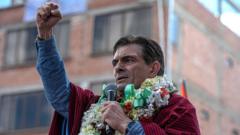Is Bolivia Turning a New Leaf with Centrist Rodrigo Paz's Election?

Published: 2025-10-20 09:00:17 | Category: world
Bolivia has elected Rodrigo Paz, a centrist senator from the Christian Democratic Party, as its new president, marking a significant shift in the country's political landscape after nearly 20 years of dominance by the Movement for Socialism (Mas) party. Paz triumphed over right-wing candidate Jorge "Tuto" Quiroga in a run-off election, securing 54.6% of the votes. Faced with a severe economic crisis and dissatisfaction with the ruling party, many Bolivians sought change, leading to this pivotal election outcome.
Last updated: 08 November 2023 (BST)
- Rodrigo Paz won the presidential election with 54.6% of the votes.
- The election signifies the end of Mas's nearly two-decade rule in Bolivia.
- Paz has pledged to address economic issues, including fuel shortages and inflation.
- His administration may improve relations with the United States.
- Paz's vice president-elect, Edman Lara, is noted for his anti-corruption stance.
- The election reflects a strong desire for political and economic change among voters.
The Political Shift in Bolivia
The recent presidential election in Bolivia has brought about a major political shift. After nearly 20 years of uninterrupted rule by the Mas party, the election of a centrist candidate represents a significant change in direction for the nation. Rodrigo Paz's victory is not just a win for his party but is seen as a collective call for reform from the electorate, who are weary of the economic difficulties and political infighting that have characterised recent years.
Understanding the Election Results
In the run-off election held on 5 November 2023, Rodrigo Paz emerged victorious against Jorge "Tuto" Quiroga, capturing 54.6% of the votes. This outcome reflects a growing desire among the electorate for a change in leadership and policy direction. The Mas party, which had been a dominant force in Bolivian politics since 2006, failed to reach the run-off, highlighting a decline in its popularity.
Key Factors Leading to the Change
Several key factors contributed to Paz's victory:
- Economic Crisis: Bolivia has faced severe economic challenges, including fuel shortages, soaring inflation, and a lack of US dollars. This has left many voters seeking a fresh approach to governance.
- Voter Disillusionment: Infighting within the Mas party has led to disillusionment among its supporters. This fragmentation allowed Paz to capture the support of those who wanted change but were wary of more extreme right-wing options.
- Moderate Image: Paz's centrist stance made him appealing to undecided voters and those discontented with the previous administration, positioning him as a viable alternative.
Paz's Promises and Policies
Rodrigo Paz has made several bold promises aimed at revitalising the Bolivian economy and addressing the pressing issues citizens face. His campaign slogan, "capitalism for all," underscores his commitment to free-market reforms while ensuring assistance for the poorest segments of society.
Key Economic Policies
As president, Paz plans to implement a range of economic policies:
- Ending Fuel Shortages: He aims to resolve the ongoing fuel shortages that have plagued the country, which are exacerbated by unsustainable fuel subsidies.
- Tax and Trade Reforms: Paz has pledged to lower certain taxes, reduce import tariffs, and stimulate private-sector growth.
- Decentralisation: He intends to decentralise the government to improve local governance and accountability.
- Anti-Corruption Measures: His administration will focus on cracking down on corruption within government ranks to restore public trust.
Impact on International Relations
Paz's election could lead to significant changes in Bolivia's international relations, particularly with the United States. Historically, relations have been strained since 2008, but Paz's centrist policies may pave the way for a thawing of ties. The US State Department has expressed optimism regarding collaboration to restore economic stability and enhance security.
Potential Shifts in Foreign Policy
As Paz takes office, he may consider realigning Bolivia's foreign policy, distancing the country from leftist allies like Venezuela and Cuba. This shift could help to rebuild relations with Western nations and attract more foreign investment.
China remains a vital trade partner for Bolivia. Paz's administration is expected to continue to engage with China, focusing on securing investments in key sectors such as lithium and minerals, which are crucial for the country's economy.
The Role of Edman Lara
Paz's choice of running mate, Edman Lara, has been strategic in attracting working-class voters disillusioned with corruption. A former police captain, Lara is known for his humble beginnings and whistleblowing on police corruption, which resonates with many Bolivians frustrated by governmental misconduct.
Lara's Impact on the Election
Lara's anti-corruption stance and social media presence helped galvanise support for the ticket, positioning them as a duo committed to transparency and reform. This dynamic may prove vital in Paz's efforts to unite a fractured country moving forward.
Challenges Ahead for the New Administration
Despite the optimism surrounding Paz's election, he inherits a country grappling with economic turmoil and a deeply divided society. Restoring economic credibility and fostering national unity will be a daunting task.
Addressing Economic Pressures
Paz must navigate a challenging economic landscape marked by high inflation, fuel shortages, and declining natural gas revenues. His proposed reforms will need to be carefully implemented to ensure they lead to tangible improvements without further alienating segments of the population.
Political Polarisation
With Bolivia's political landscape fragmented, uniting various factions will be essential for Paz's success. His ability to bridge divides and foster collaboration among diverse groups will determine the effectiveness of his administration.
Conclusion
Rodrigo Paz's election as Bolivia's new president represents a pivotal moment in the nation's history, signalling a desire for change after years of political dominance by the Mas party. While his promises of economic reform and anti-corruption measures have garnered hope among voters, the challenges he faces are substantial. As Paz prepares to take office on 8 November 2025, the eyes of Bolivia and the international community will be on his efforts to restore stability and unite a divided nation.
How effectively will Rodrigo Paz implement his promised reforms, and can he successfully bridge the political divides in Bolivia? #BoliviaElection #RodrigoPaz #PoliticalChange
FAQs
Who is Rodrigo Paz?
Rodrigo Paz is the newly elected president of Bolivia, representing the Christian Democratic Party. He won the election on 5 November 2023, ending nearly 20 years of rule by the Movement for Socialism party.
What are Paz's main policies?
Paz aims to address economic issues, including fuel shortages and inflation, by implementing free-market reforms, decentralising government, and cracking down on corruption.
How might Paz's election affect Bolivia's international relations?
Paz's victory could lead to improved relations with the United States and a potential realignment of Bolivia's foreign policy, distancing the country from leftist allies like Venezuela and Cuba.
What challenges does Paz face as president?
Paz inherits a country facing severe economic difficulties and political polarisation, making it crucial for him to unify various factions while implementing effective reforms.
When does Rodrigo Paz take office?
Rodrigo Paz is set to officially take office on 8 November 2025, where he will begin implementing his proposed policies and reforms.



